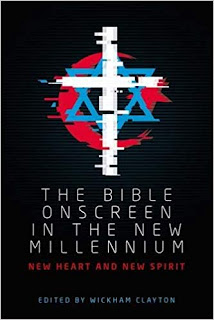Esther, Ezra and Nehemiah
 As I've mentioned here in the past I currently lead a course called Through the Bible in Five and a Half Years where we look at a different book of the Bible every month. In July we'll be looking at Esther and given how this story is a popular one with filmmakers (see all posts on Esther films), and how our baby is due any minute, I thought I might use some extended clips from one or two of them.
As I've mentioned here in the past I currently lead a course called Through the Bible in Five and a Half Years where we look at a different book of the Bible every month. In July we'll be looking at Esther and given how this story is a popular one with filmmakers (see all posts on Esther films), and how our baby is due any minute, I thought I might use some extended clips from one or two of them.One of the Esther films I have always liked is the Bible Collection's version. It was one of the first in the series I watched, and it was perhaps the first time that I realised that the early part of the story wasn't some fairy tale love story, but that of state-sanctioned rape. It's possible that Esther enjoyed the glamour of it all, but the Bible certainly doesn't mention that. (Having said that even this film hints at a love story. Note the shot above - the first time the camera gazes upon Esther - and how the intimate close up and soft focus suggest romance). Naturally, then, this is one of the clips I'm thinking about showing, so last night I began to re-watch it.
The first thing I noticed was that both Ezra (below) and a young Nehemiah appear in this film. This was a little frustrating as I had hunted for relevant film clips during the last two months, if only to find a suitable image for the Through the Bible... blog. But having studied those books in some depth now it was interesting to see how the film treated the characters.
 Of the two, it's Ezra who gets the most screen time. Ezra's a friend (or disciple?) of Mordecai and we meet him even before we meet Esther. As a thief is dragged away by the Persian guards, Mordecai voices his dismay at the likely severity of the thief's punishment; he will have his hand cut off. When Ezra replies that such is the Persian way Mordecai begins to reply. "It's not the harshness Ezra, it's the absence of clemency. We Jews should remember when we write our own laws..." but he is then cut off by the arrival of Haman.
Of the two, it's Ezra who gets the most screen time. Ezra's a friend (or disciple?) of Mordecai and we meet him even before we meet Esther. As a thief is dragged away by the Persian guards, Mordecai voices his dismay at the likely severity of the thief's punishment; he will have his hand cut off. When Ezra replies that such is the Persian way Mordecai begins to reply. "It's not the harshness Ezra, it's the absence of clemency. We Jews should remember when we write our own laws..." but he is then cut off by the arrival of Haman.There's a fair bit packed into Mordecai's statement. Firstly, it clarifies that this Ezra is the same man who will go on to lead the Jewish people, and establish them as a people who (actually) follow the law. Lest their be any doubt, a little later he advises Mordecai not to let Esther "marry a foreigner". But there's more to it than that. Whilst the books of Ezra and Nehemiah present their leading man taking the people back to the law of Moses, there are also a few differences. Scholars disagree as to how much input Ezra had in the process, and whilst Deuteronomy seems to have been a written text by the time of Josiah, some claim that not much else was actually in written form by this point. Mordecai's statement seems to suggest that the laws weren't written by that point, and that Ezra was amongst those responsible for writing them down.
But there's more to it as well. Whilst Mordecai is shown as older and wiser, it doesn't appear that Ezra takes a great deal of notice of him. Indeed it's generally a very unflattering portrayal of Ezra; he comes across as arrogant and judgemental. There's very little compassion and this tends to be underlined by the actor's harsh an unattractive face. So the film doesn't seem to think a great deal of Ezra and is keen to show that not everyone was behind his abrasive approach to reform.
 Nehemiah's appearance (above) is briefer and he appears much younger than Ezra. There's some debate as to which of these two men acted first, but the film seems to back the theory that Ezra came first and needed Nehemiah's work to complete the job. This again suggest a fairly low opinion of Ezra. Those who value his input more highly tend to suggest that he was completing Nehemiah's work and not vice versa.
Nehemiah's appearance (above) is briefer and he appears much younger than Ezra. There's some debate as to which of these two men acted first, but the film seems to back the theory that Ezra came first and needed Nehemiah's work to complete the job. This again suggest a fairly low opinion of Ezra. Those who value his input more highly tend to suggest that he was completing Nehemiah's work and not vice versa.Nehemiah is also portrayed more positively. Whilst still not classically good looking he has a soft, endearing face, and his demeanour suggests he is humble, receptive and teachable. He is, of course, being tutored in the art of wine tasting, but there's enough in this brief vignette to hint at how this Nehemiah's future might pan out.
There were a few other points that I noticed. Firstly, in the film Ezra links Haman to the Amalekites of King Saul's time. This is something I'd missed before, and probably only picked up because it's significance is enhanced in the 2006 Esther film One Night With the King. Both films draw on a Jewish tradition that considered the Amalekite King Agag (whom Saul spares and Samuel kills in 1 Sam 15) to be the ancestor of Haman who is described in Esther 3:1 as "Haman son of Hammedatha, the Agagite".
 The film actually pays quite a lot out of attention to the various names. For example, as with the Bible, Esther is originally called Hadassah, but as she is taken to the palace Mordecai tells her to change her name to Esther - a Persian name. Later on the chief Eunuch, Hegai, somewhat awkwardly, expounds the meaning of the name. It's a variation on the name Ishtar - the Babylonian goddess of love. It's kinda funny that originally this name was chosen to sound un-Jewish, and yet these days Esther it's considered a classic Jewish name.
The film actually pays quite a lot out of attention to the various names. For example, as with the Bible, Esther is originally called Hadassah, but as she is taken to the palace Mordecai tells her to change her name to Esther - a Persian name. Later on the chief Eunuch, Hegai, somewhat awkwardly, expounds the meaning of the name. It's a variation on the name Ishtar - the Babylonian goddess of love. It's kinda funny that originally this name was chosen to sound un-Jewish, and yet these days Esther it's considered a classic Jewish name.The film also calls Esther's husband Ahasuerus. This is in line with the original texts, but most translations these days use Xerxes instead. Whilst it's likely that Ahasuerus and Xerxes are one and the same, I'm glad the film sticks with what's in the text rather than try and interpret it in order to make the story seem definitively historical.
All this and I'm only about 40% of the way through the film! I do seem to recall that the opening part of the film is the strongest, but we'll have to see. The film is already quite different to how I remember.
Labels: Bible Collection (The), Esther, Ezra, Nehemiah













0 Comments:
Post a Comment
<< Home